OCZ’s Vertex Limited Edition Review & SSD State of the Union
by Anand Lal Shimpi on February 19, 2010 12:00 AM EST- Posted in
- Storage
Back in December I previewed OCZ’s Vertex 2 Pro, the first drive I’d tested to use SandForce’s SF-1500 controller. As you may remember, the controller works in a radical way - by reducing the amount of data written to flash it improves performance and longevity, at the cost of controller/firmware complexity. Not a bad tradeoff for a company trying to sell you expensive SSD controllers. If you want to know more about how it works, I'd suggest consulting my Vertex 2 Pro Preview. If you want to know how SSDs work, take a look at the SSD Relapse.
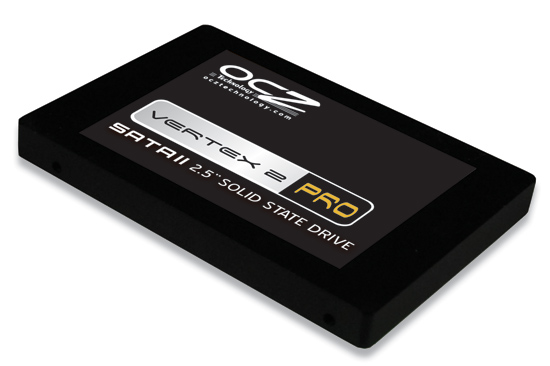
RIP...
The drive made an impressive showing, easily besting any other MLC SSD I’d ever tested. Unfortunately, it was pre-release hardware, with no known price and no set release date. Not to mention that the company who made the controller was shipping largely unproven technology with an unknown amount of reliability/validation testing.
Since then two things have happened.
First, my SandForce SF-1500 pre-release sample straight up died on me. No warning, no errors, just no data. It only took a couple of weeks worth of real world use to make it happen, but this is why I prefaced the preview with the following:
“Ultimately, the task of putting these drives to the test falls on the heads of you all - the early adopters. It’s only after we collectively put these drives through hundreds and thousands of hours of real world usage that we can determine whether or not they’re sponge-worthy. Even Intel managed to screw up two firmware releases and they do more in-house validation than any company I’ve ever worked with. The bugs of course never appeared in my testing, but only in the field in the hands of paying customers. I hate that it has to be this way, but we live in the wild west of solid state storage. It’ll be a while before you can embrace any new product with confidence.
And it only gets more complicated from here on out. The old JMicron drives were easy to cast aside. They behaved like jerks when you tried to use them. Now the true difference between SSDs rears its head after months or years of use.”
And second, the OCZ Vertex 2 Pro as a product has been canned. Not because of the issue that lead to the untimely death of my drive, but because the SF-1500 controller is just too expensive. I knew that it was going to be pricey at the time I wrote the article, but apparently OCZ thought it could bring the price down by the time it shipped. Needless to say, that didn’t happen.
Instead of the Vertex 2 Pro, OCZ will be shipping the regular Vertex 2 based on SandForce’s slower SF-1200 controller. This SSD will carry a pricetag similar to present day Vertex drives, but hopefully offer better performance. For enterprise customers OCZ will ship the Vertex 2 EX based on the SF-1500 with SLC flash and a ginormous, quarterly-budget depleting pricetag (to be determined). The consumer MLC SF-1500 based Vertex 2 Pro is gone forever.
Here’s where the Vertex Limited Edition comes in:
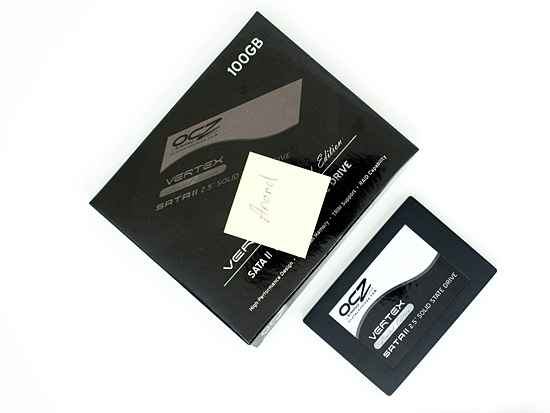
Despite its name, the Vertex Limited Edition is an MLC SandForce SF-1500 SSD (technically it's a SF-1200/SF-1500 hybrid like the Vertex 2 Pro, but that's a separate issue entirely). It's basically the Vertex 2 Pro with one big caveat - there are only a limited number of these drives being made - 5,000 to be exact. Once they're all gone, that's it.
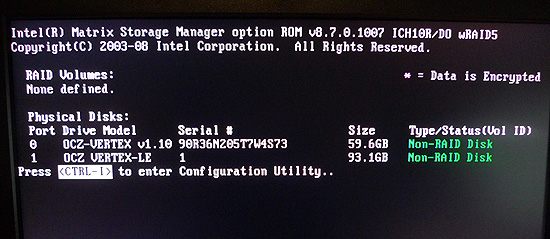
My Vertex LE is Serial #1. Ebay, here I come!
OCZ apparently got a sweetheart deal on an early batch of SF-1500s. This is the same controller from the Vertex 2 Pro in December, but with an updated firmware (RC1). These are the first drives shipping with RC1 of the SF-1500 firmware and will presumably not die on you after a couple of weeks. While I’ve heard that they may not be enterprise worthy, they are apparently fit for desktop use. OCZ has said that in its internal testing there haven't been any cases of a bricked Vertex LE. The same was not true during the Vertex 2 Pro test period. Now here comes the problem.
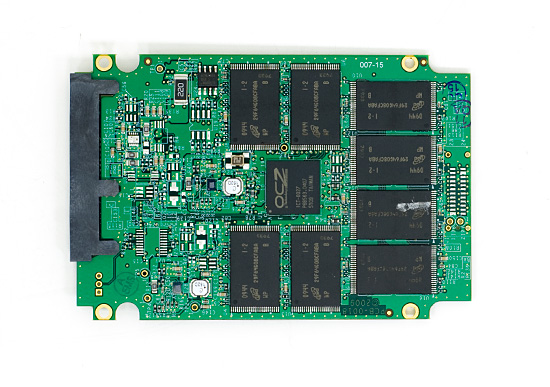
The OCZ Vertex Limited Edition. That's a SandForce SF-1500 controller under that OCZ logo in the middle.
I literally just received my drive 24 hours ago. Just like its ancestor, this thing will be put through the wringer for the coming weeks and months. However long it takes to make sure it is worthy of your dollars. The problem is that these drives are limited in quantity, chances are they will all be gone by the time I figure out whether or not they are worthy of a glowing recommendation.
What makes the Limited Edition so special is that because of OCZ’s great pricing on the SF-1500 the 100GB Vertex LE will be selling for $399 ($829 for the 200GB version) - roughly the same price as a 128GB Indilinx based Vertex drive. And in case you’re wondering, yes it performs identically to the Vertex 2 Pro I previewed last year:
| OCZ Vertex LE 100GB | OCZ Vertex 2 Pro 100GB | |
| 4KB Random Write | 51.2 MB/s | 50.9 MB/s |
| 2MB Sequential Write | 252.7 MB/s | 252.0 MB/s |
| 4KB Random Read | 52.0 MB/s | 51.3 MB/s |
| 2MB Sequential Read | 265.3 MB/s | 265.3 MB/s |
| PCMark Vantage Overall | 16827 | 16767 |
| PCMark Vantage HDD | 39288 | 39970 |
| AT Bench - Light | 884 IOPS | 890 IOPS |
| AT Bench - Heavy | 701 IOPS | 705 IOPS |
| AT Bench - Gaming | 319 IOPS | 319 IOPS |
For roughly the same price per GB you’d pay for an Intel X25-M G2, you’re getting a much faster drive. The only issue is that its reliability is unproven. To calm your fears, OCZ is selling the Vertex LE with a 3 year warranty.
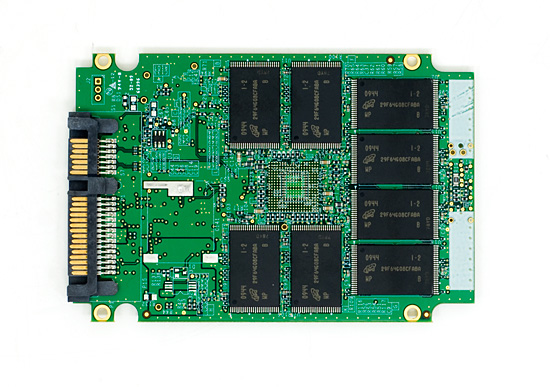
Barring any unforeseen issues, the drives will go on sale next week. Risky business.
I should note that we’ve seen vendors get quite opportunistic with hot SSDs in limited quantities before. There’s always the chance that these Vertex LEs will sell for more than their MSRP.
The nifty OCZ Toolbox I showed in my Vertex 2 Pro preview presently doesn’t work with the Vertex LE. The application looks for SandForce in the controller id, which is absent from these unbranded SF-1500 controllers that SandForce unloaded. By the time the drives ship though there should be a custom version of the OCZ Toolbox ready. TRIM is supported and works perfectly under Windows 7.
Unlike the Vertex 2 Pro sample I tested, the Vertex LE doesn’t have the ungodly expensive capacitor on its PCB. As I mentioned before, these aren’t designed to go into servers and thus the supercap won’t be missed. Performance on the drive is great and I haven’t had any issues thus far in my testing, but there’s a long road ahead of me.
The RC1 firmware is brand new to me. I’ll be putting the drive through its paces but given that the units will go on sale next week I decided to share my initial thoughts today rather than wait.










83 Comments
View All Comments
v12v12 - Tuesday, February 23, 2010 - link
YES! You tell these idiot RAID-0 fanboys that it's USELESS and doesn't offer any real world benefit for all the potential catastrophic FAILURE it can cause, and the fact that it's DOUBLE: the drive price, double the heat, double the noise, double the space required, double capacity loss... the list of negatives about RAID-0 go on and on.__ WHile nobody talks about RAID-1, like it's some redheaded-step-child. RAID-1 is the BEST thing anyone can do if they value their data. Screw a meager speed increase (very subjective/specific to the intended usage) when you risk losing it all and THEN you'll spend how many HOURS of DOWN TIME cursing your HDs to hell? Logic right out the window folks...
RAID-O has long been proven to be a complete WASTE OF TIME! Go search Xbit-labs, Storage review and the myriads of other comparisons that PROVE (again not my opinion) that it's a farce and doesn't belong on "desktop" systems at all: stupid gamers/fanboys never learn.
funkyd99 - Tuesday, February 23, 2010 - link
I wouldn't call double the capacity useless. Before you generalize everyone who uses RAID-0 as an "idiot fanboy", realize that:1. Some people need more than 160GB of storage for their primary drive, and prefer a hardware solution vs. a software solution such as dynamic disks.
2. Some people have a solid bare-bones backup solution in place, and can recover from a catastrophic failure in less than an hour.
3. RAID-1 on a desktop is the waste of time and hardly the best thing someone can do if they value their data. Please tell me how RAID-1 will save your data if a faulty power supply fries everything in your computer, or a faulty controller writes a bunch of garbage to both disks, etc. etc. An external drive and a weekly backup is safer than relying on RAID-1 as a backup solution.
4. Some people can get a point across without resorting to name-calling and CAPS.
mlambert890 - Thursday, February 25, 2010 - link
This is so well said. Why are so many people so insanely emotionally involved with disk drives, video cards, etc?There is no "final answer" discussing RAID 0. Lots of people like to declare they have a "final answer" and call anyone who dissents an "idiot", but this is just noise.
As has always been the case with *any* RAID level, cost/benefit analysis really depends almost entirely on your use case and indvidiual situation. It is tempting to try to paint with a broad brush (especially on web forums), but reality just doesnt work that way
Anyone who understands RAID, storage, or really technology in general in any meaningful way, knows this.
A lot of technology passes through my hands as a result of my profession (and a lot has come and gone during the course of a 20 year career).
Annecdotally, I can tell you right now that I absolutely "feel" the difference between Intel SSD single drive and the sames drives in RAID 0. I have the two setups sitting right here for testing. Synethetics show a difference, and the difference is measurable and noticeable. Many people say they don't notice the difference between SSD and *HDD*. They arent wrong - perception is subjective.
Objectively, however, RAID-0 yields a performance increase. Whether or not one can perceive it or feels the tradeoff is worth it (as is ALWAYS the case with RAID-0), is a subjective and individual decision.
Some day a lot of these kids are going to look back on their post history (unique thing - your words last forever on the internet) and wonder what the heck they were thinking...
kmmatney - Friday, February 19, 2010 - link
I agree. NewEgg just had the Intel 80 GB SSD on sale for $219. They sold out pretty fast, though. I think at the end of the day, you can't go wrong with Intel for an SSD. Their toolbox can schedule a anutomatic TRIM operation once a week for Windows Xp systems as well, so lack of autoatic TRIM in Window XP is not an issue.leexgx - Saturday, February 20, 2010 - link
intel toolbox will only work in AHCI mode (Sata mode as well i think but you lose NCQ) and no updated chipset drivers or no intel matrix drivers installedmschira - Friday, February 19, 2010 - link
typo gallore...
But I am so excited...
M.
micksh - Friday, February 19, 2010 - link
Vertex LE 200GB is $920 at Amazon (preorder, no availability date)http://www.amazon.com/OCZ-Technology-Limited-2-5-I...">http://www.amazon.com/OCZ-Technology-Li...-Inch-OC...
Just one note. Numbers on charts are aligned to bars and text is aligned to the left edge of the chart. If the bar is too short the numbers overlap with text and it's hard to read the numbers.
Shining Arcanine - Friday, February 19, 2010 - link
I thought Linux's ext4 and btrfs filesystems supported TRIM too. Why do you say that only Windows 7 supports TRIM?Chlorus - Sunday, February 21, 2010 - link
Because BTRFS is still experimental and EXT4 is a piece of shit that randomly corrupts large files?gwolfman - Friday, February 19, 2010 - link
Anand,I'm jealous of your serial number: 1.
OCZ showing some special love to you. :)